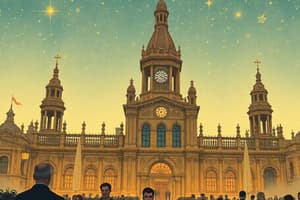Podcast
Questions and Answers
Freedom of expression is not considered essential for a democracy.
Freedom of expression is not considered essential for a democracy.
False (B)
The right to free speech and expression in India is guaranteed by Article 19(1)(a) of the Constitution.
The right to free speech and expression in India is guaranteed by Article 19(1)(a) of the Constitution.
True (A)
Article 19(1)(b) of the Indian Constitution safeguards the freedom of artistic expression.
Article 19(1)(b) of the Indian Constitution safeguards the freedom of artistic expression.
False (B)
Censorship is beneficial for fostering a climate of open inquiry and debate.
Censorship is beneficial for fostering a climate of open inquiry and debate.
The media's role is insignificant in ensuring the free flow of information and ideas.
The media's role is insignificant in ensuring the free flow of information and ideas.
Article 19(1)(a) of the Indian Constitution guarantees the right to freedom of speech and expression, including the right to form and disseminate information through various media forms.
Article 19(1)(a) of the Indian Constitution guarantees the right to freedom of speech and expression, including the right to form and disseminate information through various media forms.
Censorship is always necessary to protect freedom of expression and press freedom.
Censorship is always necessary to protect freedom of expression and press freedom.
The Indian government's role in regulating censorship is solely defined by the Cinematograph Act.
The Indian government's role in regulating censorship is solely defined by the Cinematograph Act.
Artistic expression does not have any constitutional safeguards in India.
Artistic expression does not have any constitutional safeguards in India.
Balancing freedom of expression and respecting the rights of others is not a continuous challenge.
Balancing freedom of expression and respecting the rights of others is not a continuous challenge.
Flashcards are hidden until you start studying
Study Notes
Unleashing Self-Expression: Understanding "Abhivyakti ki Swatantra"
From the vibrant exchanges on digital platforms to the nuanced debates in judicial halls, the concept of "Abhivyakti ki Swatantra" encompasses the fundamental rights to freedom of expression, artistic expression, speech, and press. This article guides you through the interconnected realms of these freedoms, exploring their foundations, challenges, and the ongoing fight for a more expressive and inclusive society.
Freedom of Expression
Freedom of expression is the cornerstone of democracy, allowing individuals to exchange ideas, opinions, and information, fostering a climate of open inquiry and debate. In India, this freedom is ensconced in the Constitution, particularly Article 19(1)(a), which guarantees the right to free speech and expression.
Constitutional Rights
India's Constitution provides for a spectrum of fundamental rights, including the right to free speech and expression. The Constitution of India has also ensured both individual and collective freedoms through articles like 19(1)(a) and 19(1)(b), which safeguard the freedom of speech and expression, assembly, and association, respectively.
Speech and Press Freedom
The media plays a crucial role in ensuring the free flow of information and ideas. Article 19(1)(a) of the Indian Constitution confers the right to freedom of speech and expression, which includes the right to form and disseminate information through various forms of media, such as print, electronic, and digital.
Censorship Issues
Censorship is a perennial challenge to freedom of expression and press freedom. While some forms of censorship may be necessary to protect national security, public order, decency, or morality, the misuse of censorship can stifle the free exchange of ideas. The Indian government's role in regulating censorship is complex; it is bound by statutes like the Indian Penal Code, Information Technology Act, and the Cinematograph Act.
Artistic Expression
Artistic expression plays a pivotal role in shaping culture and societal perceptions. In India, the Constitutional safeguards for artistic expression are found in Articles 19(1)(a) and 300A, which protect the right to freedom of speech and expression and the right to practice and propagate any religion.
Conclusion
"Abhivyakti ki Swatantra" is an inspired and holistic approach to understanding the complex interplay between individual rights, Constitutional guarantees, and societal norms. Balancing the freedom to express oneself and the responsibility to respect the rights of others is an ongoing challenge. By exploring the fascinating intersections of freedom of expression, speech, press, and artistic expression, we gain a deeper understanding of the fundamental principles that underlie our democratic societies.
As we navigate the tumultuous waters of the digital age, our commitment to protecting and promoting freedom of expression, speech, and artistic expression is more important than ever. Empowered with knowledge and a shared vision, we can work to create a more open, inclusive, and just society, in which the human spirit is set free to dream, to create, and to explore the boundless worlds of self-expression.
Studying That Suits You
Use AI to generate personalized quizzes and flashcards to suit your learning preferences.




